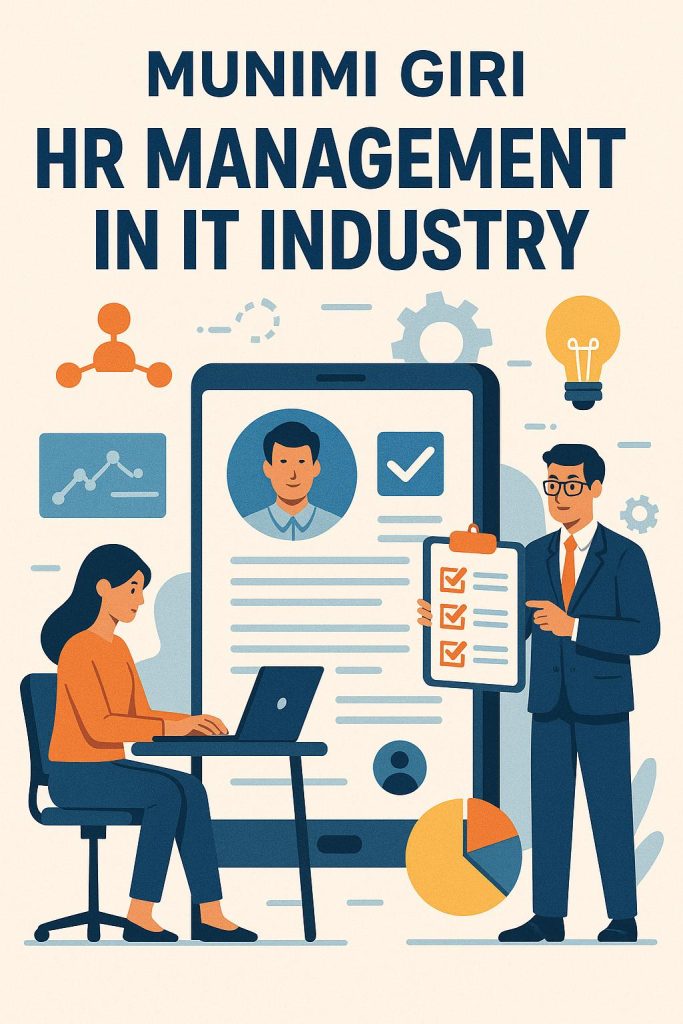In today’s rapidly evolving digital landscape, the HR Role in IT Company is undergoing a massive transformation. As IT businesses scale new heights and become increasingly complex, the demand for strategic, tech-savvy, and data-driven human resources has never been higher. No longer confined to hiring and payroll, HR has emerged as a critical pillar of business growth, innovation, and talent management. This shift marks a powerful new chapter for HR professionals working within the IT sector—one where they are not just administrative support but active enablers of technology, culture, and performance. In this era, leaders like Munimi Giri are redefining how HR operates in the world of technology.
Redefining the HR Role in IT Company in the Digital Age
The HR Role in IT Company is now deeply strategic. With the war for top tech talent intensifying, HR professionals must act fast to attract, retain, and nurture high-performing individuals. This means building employer brands that stand out, designing recruitment processes that are seamless and tech-integrated, and establishing cultures where innovation thrives. In the competitive IT space, companies depend on their HR leaders not just to fill vacancies, but to shape their workforce strategy.
Moreover, the HR Role in IT Company goes beyond recruitment. HR is responsible for understanding workforce trends, foreseeing skill shortages, and addressing future learning needs. It’s about aligning the talent strategy with business goals, ensuring every hire contributes to long-term growth and technological innovation.

Powering Decision Making with HR analytics in IT
Another crucial element transforming the HR Role in IT Company is the emergence of HR analytics in IT. From tracking employee engagement to predicting attrition, HR analytics in IT offers real-time insights that empower HR teams to make smarter decisions.
Through HR analytics in IT, companies can identify productivity patterns, recognize high-potential employees, and even detect burnout risks before they escalate. This kind of predictive intelligence enables proactive interventions that enhance employee satisfaction and organizational performance. For instance, analytics tools can measure the success of training programs or help optimize the structure of remote teams. These insights become game-changers in the hands of skilled professionals like Munimi Giri.
By embracing HR analytics in IT, companies gain a competitive edge. They are no longer reacting to changes—they are anticipating them. Integrating AI and machine learning into HR systems further enhances this capability, making HR a vital player in digital transformation.
Modernizing HR Management in the IT Industry for Future Readiness
The IT sector is dynamic, global, and constantly shifting. Effective HR Management in IT Industry requires agility, foresight, and innovation. Traditional management models are being replaced by adaptive frameworks that prioritize employee experience, diversity, and continuous learning. HR Management in IT Industry is not about command and control—it’s about collaboration, empathy, and empowerment.
One key trend shaping HR Management in IT Industry is the rise of remote and hybrid work models. They must also navigate legal complexities, cybersecurity concerns, and digital onboarding processes. In this context, HR becomes the glue that holds remote-first organizations together.
Leaders like Munimi Giri understand that strong HR Management in IT Industry means investing in digital tools, upskilling HR professionals, and staying ahead of industry trends. Whether it’s cloud-based HR software or digital feedback loops, modern HR teams must be tech-fluent and agile.
Building Employer Brand and Culture with Human Touch
The HR Role in IT Company also includes shaping company culture—a factor that often determines long-term success. Tech talent is drawn to workplaces that value creativity, flexibility, and purpose. HR leaders must build environments where people feel heard, included, and inspired.
At the heart of every successful IT company is a strong culture, and it’s HR’s job to nurture it. From organizing wellness programs to promoting diversity and inclusion, HR’s cultural role is as critical as any technical function. And with tools like HR analytics in IT, measuring cultural health is now possible, allowing companies to make informed improvements.

Why Munimi Giri Is a Name to Watch in HR Innovation
With a vision grounded in innovation and empathy, Munimi Giri is at the forefront of redefining the HR Role in IT Company. Her approach combines strategic thinking with a deep understanding of human behavior and technology. She believes that the future of HR lies in blending analytical thinking with emotional intelligence—a philosophy that’s essential for effective HR Management in IT Industry.
By leveraging the power of HR analytics in IT, and fostering a culture of transparency and growth, Munimi Giri stands as a pioneer in the HR-tech landscape. Her thought leadership continues to inspire HR professionals and IT organizations alike.
Conclusion
The HR Role in IT Company is no longer just about managing people—it’s about managing potential. With the integration of HR analytics in IT and a modern approach to HR Management in IT Industry, companies can unlock innovation, performance, and resilience. Leaders like Munimi Giri are proof that with the right mindset and tools, HR can become the engine driving transformation in the tech world.
